Author: dentist
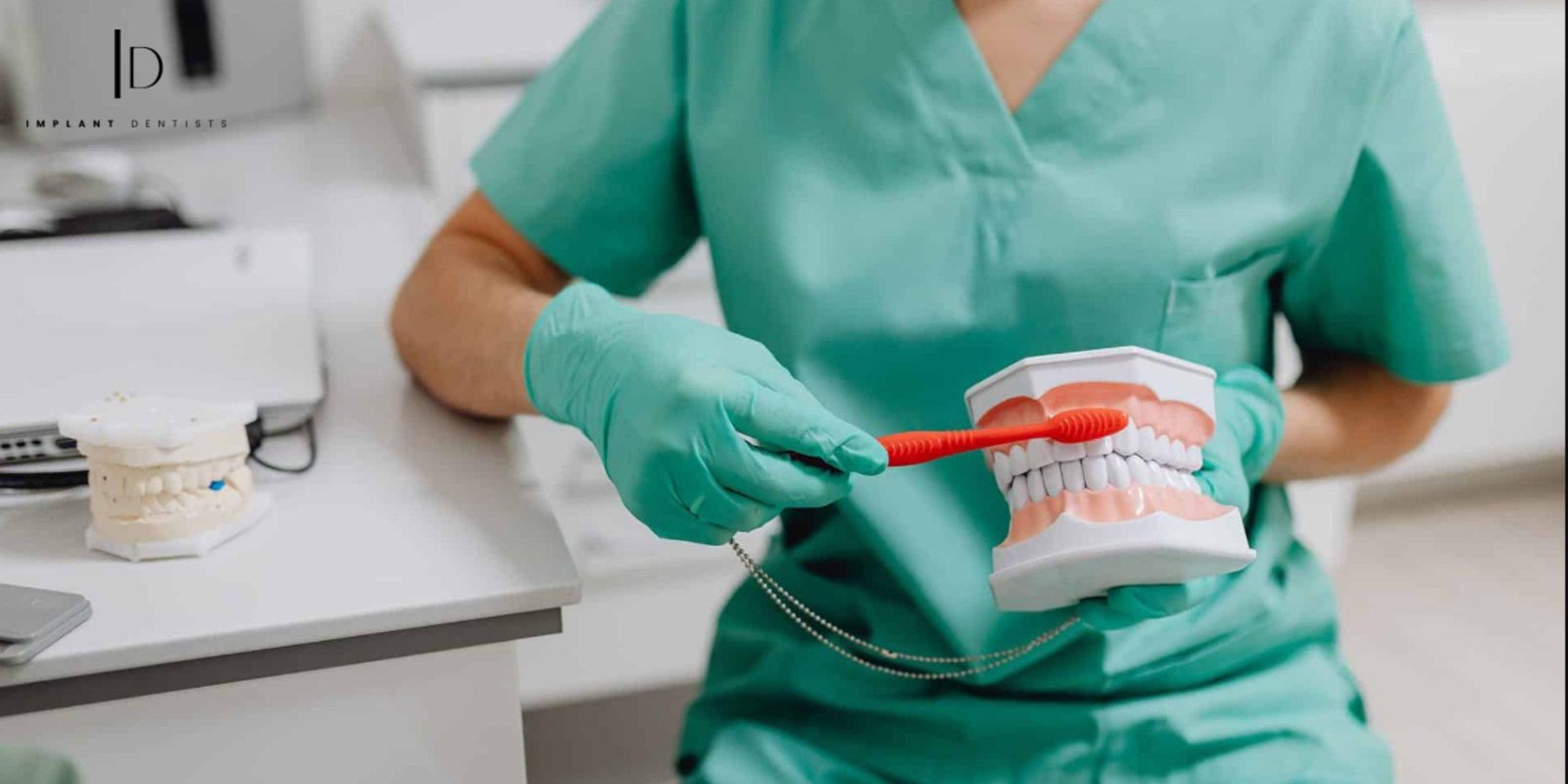
Affordable Dental Implants | Finding Cheap Solutions for Fixed Teeth in the UK
March 11, 2024When addressing the issue of missing teeth, the evolution of dental technology has introduced a diverse array of replacement options. Among which fixed teeth solutions, specially the groundbreaking all the four implants, stand out. This innovative affordable dental implant procedure has revolutionized the field of tooth replacement, offering people’s in the United Kingdom an exceptional alternative through proficient affordable dental implant, particularly those practicing in Crewe.
Understanding Teeth Replacement
Replacing missing teeth is a vital aspect of modern dentistry, allowing people’s to restore oral functionality and regain confidence in their smiles. In the United Kingdom, specifically in Crewe, expert the implant dentists offer advanced solutions for tooth replacement, ensuring patients receive top-tier care and advanced implantology techniques.
- Traditional Dental Implants: Dental implants are titanium posts surgically inserted into the jawbone, serving as sturdy foundations for attaching replacement teeth. This method ensures stability and durability comparable to natural teeth.
- Fixed Teeth Solutions: Fixed teeth involve implant-supported prosthetics permanently affixed in the mouth, providing a secure and functional tooth replacement option.
Benefits of Teeth Replacement
- Restored Functionality: Replacing missing teeth restores the ability to chew food properly, improving digestion and overall nutrition. This enhances oral functionality, allowing for comfortable eating and speaking.
- Protecting of Jawbone Density: When teeth are missing, the jawbone can start to deteriorate due to lack of stimulation. Dental implants and other replacement options stimulate the jawbone, preserving its density and preventing bone loss.
- Prevention of Teeth Shifting: Gaps left by missing teeth can cause adjacent teeth to shift or become deranged over time. Tooth replacement prevents this shifting, maintaining the proper alignment of remaining teeth.
- Improved Oral Health: Filling the gaps left by missing teeth prevents food particles and bacteria from store in those spaces, reducing the risk of gum disease, decay, and further tooth loss.
Exploring All of Four Implant
In the United Kingdom, implant dentists in Crewe, specializing in all four implant, offer expert care and clarity in this advanced dental procedure. These dental professionals in Crewe possess extensive experience and specialized training in planetology, ensuring patients receive quality treatment and personalized care. This innovative technique involves securing a full set of teeth onto just four strategically positioned implants per dental arch. Its efficiency and reduced invasiveness make it a popular and cost-effective alternative to conventional implant procedures.
Benefits All of Four Implant
- Immediate Functionality: All the four implant allow for the attachment of a full set of teeth to just four strategically placed implants per dental arch. This often enables immediate loading, providing patients with functional teeth shortly after the procedure.
- Cost-Effective Option: All the four implant can be a cost-effective solution for full-arch restoration. The procedure utilizes fewer implants and can often avoid the need for additional bone grafting surgeries, reducing overall treatment expenses.
- Improved Stability: The strategic placement of implants in all of four implant provides stability and support for the prosthetic teeth. This stability enhances chewing and speaking abilities, offering a more comfortable and functional dental experience.
Cheap Dental Implants in the UK
For people’s in the United Kingdom seeking budget-friendly yet high-quality dental implants, several options exist to access cheap dental care. Among these choices, implant dentists in Crewe, UK, stand out for their expertise in providing cost-effective dental implant solutions. In the UK, cheap dental implants are accessible through various clinics and specialized practices. The Implant dentists, offer quality dental implant treatments at competitive prices, ensuring that cost doesn’t compromise the quality of care.
Implant Dentists in Crewe
Implant dentists in Crewe, UK, are highly skilled professionals specializing in providing advanced dental implant treatments and solutions. Renowned for their expertise and commitment to excellence, these practitioners play a pivotal role in restoring smiles and improving oral health for individuals seeking tooth replacement options.
- Expertise and Specialization: Affordable dental implant, Crewe possess extensive expertise in advanced dental implant techniques. Their specialization ensures patients receive top-tier care and precision in implant-related procedures.
- Personalized Consultation: These professionals conduct thorough assessments and create personalized treatment plans tailored to individual patients. This take into account their unique needs, preferences, and budget constraints.
Benefits of Dental Implants:
- Enhanced Functionality: Implants function just like natural teeth, allowing persons to chew, bite, and speak comfortably without restrictions. This restoration of natural dental function improves overall quality of life.
- Improved Aesthetics: Dental implants closely resemble natural teeth, providing a seamless and aesthetically pleasing appearance. They blend harmoniously with the surrounding teeth, restoring a confident smile.
- Restored Functionality: Dental implants facilitate comfortable biting, chewing, and speaking, closely mimicking natural teeth.
- Boosted Confidence: Restoring a complete smile with dental implants often leads to increased self-confidence. A better self-image, positively impacting social interactions and overall well-being.
- Enhanced Aesthetics: They offer a natural-looking solution for missing teeth, enhancing smiles and restoring confidence.
- Enhanced Oral Health: Implants do not require alterations to nearby teeth, unlike dental bridges. This preservation of natural teeth promotes better oral health in the long run.
Conclusion:
Tooth replacement options, especially fixed teeth solutions like all of four implants, present viable alternatives for individuals seeking durable and reasonably priced dental treatments in the UK. This allows dental implant procedures accessible and tailored to the specific needs of each patient. Through these innovative solutions, people’s can regain their smiles and enjoy improved oral health and functionality.
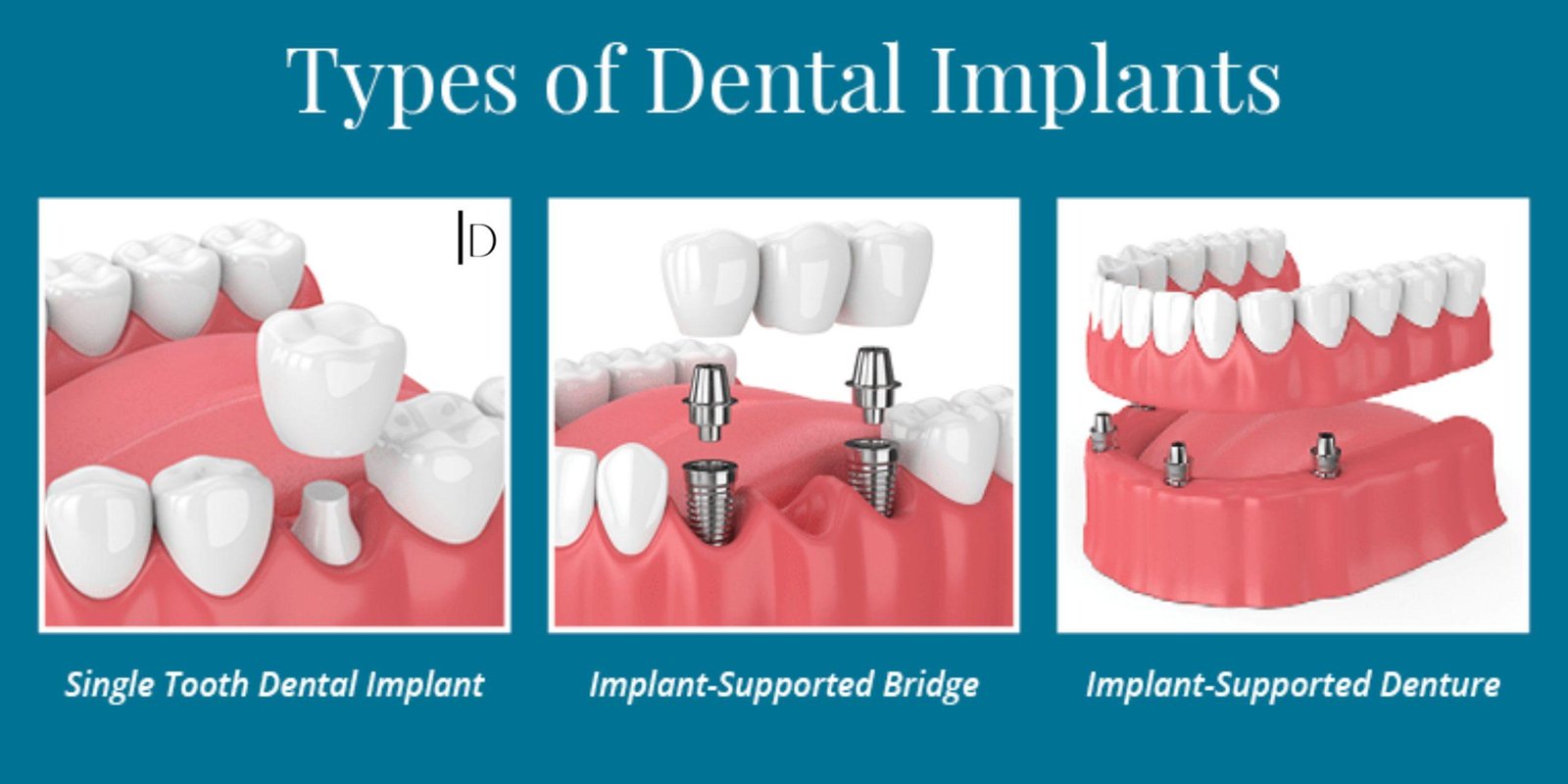
6 Dental Implant Options for Replacing Missing Teeth
March 5, 2024Maintaining optimal dental health is crucial for a lot of reasons. Beyond just showcasing a brilliant smile, healthy teeth contribute significantly to overall well-being. Research in the UK highlights the profound impact dental issues can have on daily life. The absence of a single tooth can severely hinder basic functions. Chewing and speaking can become challenging without a tooth. The loss of a tooth can make routine tasks difficult. Furthermore, untreated dental problems can escalate, leading to more serious health complications. Therefore, prioritizing broken tooth replacement not only enhances aesthetic appeal but also ensures sustained physical health and functionality.
Options available for those who have missing teeth Dental Implants
- Single Tooth Implant: Place an implant screw in the jawbone. Single Tooth Implant: Top the implant screw with a custom-made crown to replace a missing tooth.
- Implant-Supported Bridge: Replace multiple missing teeth in a row with top tooth replacement options available in the UK. Explore dental implant treatments tailored to your needs for a confident smile. Book your consultation today. An implant-supported bridge is an option. Dental professionals place dental implants at either end of the gap to provide stability and support for implant-supported bridges. They support a prosthetic bridge. 5. The prosthetic bridge spans the space.
- Implant-Supported Dentures: Traditional dentures can be secured in place with the help of dental implants. Implant-supported dentures offer increased stability and prevent issues such as slippage or discomfort commonly associated with removable dentures. Depending on the patient’s preference, they can either fix them or make them removable.
- Same-Day Teeth: Some patients can receive dental implants. With advancements in technology and techniques, these patients can have temporary crowns or bridges attached on the same day. This allows for immediate restoration of function and aesthetics.
- All-on-4 Implants: This innovative technique allows for the replacement of an entire arch of teeth using just four strategically placed implants, providing a stable foundation for a full set of prosthetic teeth.
- Guided Implant Surgery: By utilizing computer-guided technology, we carefully plan and execute implant placement with precision, resulting in optimal outcomes in terms of implant position, stability, and aesthetics.
Importance of Dental implants
Dental implants play a crucial role in modern dentistry, offering several important benefits for individuals who have lost one or more teeth. Here are some key aspects highlighting the importance of dental implants:
- Restoration of Functionality: Dental implants are designed to function like natural teeth. They provide a stable and durable foundation for artificial teeth, allowing individuals to eat, speak, and chew with confidence and comfort.
- Preservation of Jaw Bone: When a tooth is lost, the underlying jaw bone can start to deteriorate over time due to lack of stimulation. Dental implants act as artificial tooth roots, stimulating the jaw bone and preventing bone loss.
- Aesthetic Improvement: Dental implants provide a natural and aesthetically pleasing appearance. The tooth replacement teeth are custom-made to match the color, shape, and alignment of existing teeth, resulting in a seamless and attractive smile.
- Long-Term Durability: Dental implants are known for their durability and longevity. Proper care can help implants last for many years. With the right maintenance, they can last a lifetime.
- Improved Oral Health: Unlike traditional bridges, dental implants do not rely on neighboring teeth for support. This preservation of overall tooth health means that adjacent natural teeth do not compromise or alter to accommodate the implant.
- Enhanced Comfort: Dental implants eliminate the discomfort and inconvenience associated with removable dentures. Implants securely anchor in the jaw, eliminating the risk of them slipping or causing irritation to the gums.
Conclusion
In conclusion, the availability of various dental implant options allows for personalized treatment plans tailored to the unique needs and preferences of each patient. Whether a single tooth replacement or an entire arch, dental implants offer a reliable, long-term solution for restoring functionality, aesthetics, and oral health. Consulting with a qualified dental professional can help determine the most suitable implant option based on individual circumstances.

Bridge to Confidence | Exploring Bridge Tooth Implants and Replacement Teeth
February 29, 2024Losing a tooth can be an unsettling experience, impacting not only your smile but also your confidence and oral health. Fortunately, advancements in dental technology have introduced various solutions to restore missing teeth, including bridge tooth implants and replacement teeth. We’ll explore everything you need to know about these options, from their benefits to the procedure and aftercare.
What are Bridge Tooth Implants and Replacement Teeth?
Bridge tooth implants and replacement teeth are advanced artificial solutions carefully crafted to seamlessly integrate into your smile. To join advanced dental technology with precision craftsmanship, these innovations fill the gaps left by missing teeth. They renew your confidence and oral well-being in the process. Engineered for durability and comfort, they provide a permanent fix that harmonizes with your natural teeth. This ensures seamless functionality and a radiant smile for years to come.
Bridge Tooth Implants
These bridges are constructed from high-quality materials, such as porcelain, ceramic, or resilient metal alloys. They offer exceptional strength and durability. The materials used in these bridges are not only strong but also carefully chosen. They harmonize with the surrounding teeth, ensuring a seamless blend within your smile.
Replacement Teeth
Replacement teeth border a diverse array of solutions tailored to various dental needs. Dentures are one of the most common options for replacing multiple missing teeth. They are removable prosthetic devices that provide functional and aesthetic restoration. Dentures come in two forms, full dentures for entire arches of missing teeth, and partial dentures designed to fill gaps caused by the absence of one or more teeth in specific areas of the mouth.
Dental implants stand out as a remarkable advancement in dental technology. These implants serve as artificial tooth roots surgically implanted into the jawbone. They offer a robust foundation for replacement teeth, whether it’s a single tooth or multiple teeth. Dental implants provide a permanent and stable solution, mimicking the natural tooth structure and function with exceptional durability and longevity.
Benefits of Bridge Tooth Implants and Replacement Teeth
- Restored Functionality: Bridge tooth implants and replacement teeth enable you to chew, speak, and bite properly, restoring full functionality to your mouth.
- Improved Aesthetics: These prosthetic solutions replicate the appearance of natural teeth, enhancing the aesthetics of your smile and boosting self-confidence.
- Prevents Dental Issues: Replacing missing teeth helps prevent dental problems such as shifting of adjacent teeth, bone loss, and temporomandibular joint disorders.
- Long-Term Solution: Bridge tooth implants and replacement teeth are durable and long-lasting, providing a reliable solution for missing teeth that can last for many years with proper care.
- Preserves Facial Structure: Dental implants help preserve bone density in the jaw, preventing the deterioration of facial structure associated with tooth loss.
Procedure for Bridge Tooth Implants and Replacement Teeth
- Consultation: The process begins with a consultation with your dentist or prosthodontist to assess your oral health and discuss treatment options.
- Treatment Planning: We develop a personalized treatment plan for you, taking into account your specific needs and preferences, considering the number of missing teeth, evaluating the condition of your remaining teeth, and keeping your overall oral health in mind.
- Preparation: For bridge tooth implants, the adjacent teeth serving as abutments are prepared by reshaping them to take in the dental bridge. For replacement teeth supported by dental implants, implant placement surgery is performed to anchor the artificial tooth roots in the jawbone.
- Fabrication: After preparing the abutments or placing dental implants, the dentist takes impressions of your mouth. They then fabricate custom-made bridge tooth implants or replacement teeth. The new teeth are made to match the colour, shape, and size of your natural teeth.
- Placement: The bridge tooth implants or replacement teeth are securely attached to the abutments or dental implants, restoring your smile and functionality.
- Follow-Up Care: After the procedure, you’ll receive instructions on how to care for your new teeth and maintain good oral hygiene to ensure long-term success.
Aftercare for Bridge Tooth Implants and Replacement Teeth
- Practice Good Oral Hygiene: Brush your teeth twice a day, floss daily, and rinse with an antimicrobial mouthwash to keep your mouth clean and free of bacteria.
- Attend Regular Dental Check-ups: Schedule regular follow-up appointments with your dentist. Have routine examinations and professional cleanings done to monitor the health of your bridge tooth implants or replacement teeth.
- Avoid Hard Foods: Be cautious when eating hard or sticky foods that could damage your prosthetic teeth or dental implants.
- Quit Smoking: Smoking can increase the risk of complications for bridge tooth implants or replacement teeth. Consider quitting smoking to improve the success rate.
- Protect Your Teeth: If you participate in activities that could potentially harm your teeth, such as contact sports, wear a mouth guard. To protect your prosthetic teeth and dental implants, wear a mouth guard during contact sports.
Conclusion
Bridge tooth implants and replacement teeth offer effective solutions for replacing missing teeth and restoring your smile. If you choose a dental bridge or dental implants, these prosthetic devices can significantly improve your oral health. They can also enhance your function and aesthetics. If you’re considering bridge tooth implants or replacement teeth, consult with a qualified dentist or prosthodontist. They can help you explore your options and create a treatment plan tailored to your needs. With proper care and maintenance, you can enjoy a beautiful, functional smile for years to come.
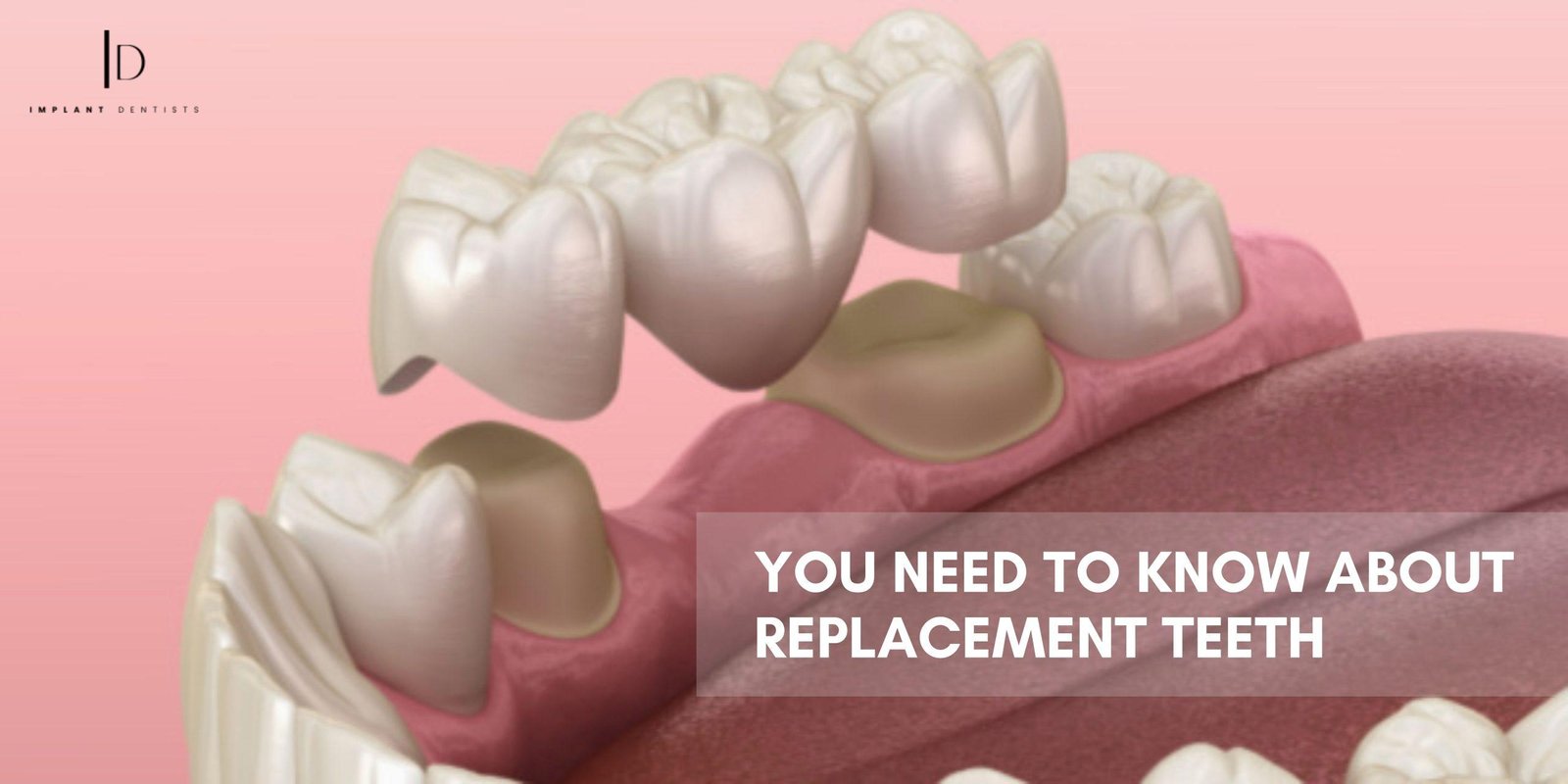
Restoring Your Smile | Everything You Need to Know About Replacement Teeth
February 21, 2024Losing a tooth can be a big deal. It affects not only your appearance but also your ability to eat, speak, and even your self-confidence. Thankfully, modern dentistry offers a variety of options to replace missing teeth and restore your smile to its former glory. Now, we’ll explore the different types of replacement teeth, their pros, and factors to consider when making your decision.
Filling the Gap: Common Types of Replacement Teeth
-
Dental Implants: Considered the gold standard, implants mimic natural teeth the most closely. A small titanium post is surgically placed in your jawbone, acting as an anchor for a crown. Implants are durable, aesthetically pleasing, and function like natural teeth. However, they’re also the most expensive option and require surgery.
-
Dental Bridges: Bridges are fixed restorations that “bridge” the gap left by missing teeth. They consist of artificial teeth attached to crowns cemented onto adjacent healthy teeth. Bridges are strong and natural-looking, but they require preparation of healthy teeth, which may not be ideal for everyone.
-
Dentures: These are removable prosthetics that replace multiple missing teeth. Full dentures cover all teeth in an arch, while partial dentures only fill in specific gaps. Dentures are generally more affordable than implants or bridges, but they may not fit perfectly and can impact speech and eating.
-
Partial Dentures with Implants: Combining implants with dentures offers the best of both worlds. Implants provide stability and prevent bone loss, while the denture fills in the gaps. This option is more expensive than regular dentures but offers superior comfort and function.
Choosing the Right Option: Factors to Consider
- Number of missing teeth: Implants are best for single teeth or multiple spaced apart. Bridges work well for a few consecutive missing teeth. Dentures are suitable for replacing all or most teeth.
- Jawbone health: Implants require sufficient bone mass for placement. Dentures might require bone grafting if bone loss is significant.
- Budget: Implants are the most expensive, followed by bridges, then dentures. Partial dentures with implants are more costly than regular dentures.
- Lifestyle and preferences: Consider your comfort level with removable options, the importance of aesthetics, and your maintenance needs.
5 Pros of Replacing Missing Teeth: Reclaim Your Smile and More!
Losing a tooth isn’t just an aesthetic concern; it impacts your physical and social well-being. Thankfully, modern dentistry offers various solutions to fill the gap and restore your smile’s glory. Beyond regaining that confident grin, here are 5 compelling benefits of replacing missing teeth:
- Eat Like a Champ: Imagine relishing a juicy steak or crunchy apple without struggling. Replacement teeth, especially implants and bridges, mimic natural teeth, allowing you to chew efficiently and enjoy a wider range of delicious foods. Say goodbye to soft diets and rediscover the joy of culinary adventures!
- Speak Clearly and Confidently: Missing teeth can slur your speech, causing self-consciousness and affecting communication. Replacements like dentures or implants improve pronunciation and enunciation, letting you express yourself clearly and confidently in every conversation. Speak your mind without hesitation!
- Boost Your Confidence: A complete smile radiates self-assurance. Replacing missing teeth can drastically improve your self-esteem, empowering you to smile brightly and engage in social interactions without holding back. Let your smile reflect your inner self!
- Protect Your Oral Health: Gaps left by missing teeth create spaces for food debris and bacteria, inviting gum disease and bone loss. Replacements prevent these issues, maintaining the health of your remaining teeth and jawbone. Invest in a healthy smile for the long term!
- Maintain Facial Structure: Missing teeth can cause facial muscles to sag, leading to premature aging and a sunken appearance. Replacements fill the gap, supporting facial tissues and preserving a youthful, healthy look. Age gracefully, not visibly!
Beyond the Basics: Additional Tips
- Consult a dentist: Discussing your individual needs and preferences with a qualified dentist is crucial for choosing the best option.
- Consider long-term implications: While cost might be an initial factor, consider the lifespan and maintenance costs of each option.
- Prioritize oral health: Regular dental checkups and proper oral hygiene are essential for maintaining any type of replacement teeth.
Replacing a missing tooth is a personal decision. By understanding the different options and carefully considering your individual needs, you can restore your smile with confidence and enjoy the benefits of a complete and healthy set of teeth.
Conclusion
Losing a tooth can feel like a loss of confidence and freedom. But fret not! Modern dentistry offers a range of replacement options, each with its own strengths and considerations. This blog served as a compass, guiding you through the different types of replacement teeth, implants, bridges, dentures, and their exciting hybrid – providing an overview of their pros, cons, and suitability based on your unique needs.
Remember, the choice for a replacement tooth is personal. By considering your budget, jawbone health, lifestyle, and aesthetic preferences, you can pave the way for an informed decision alongside your trusted dentist. Don’t let a missing tooth dim your smile – with the right approach, you can reclaim your confidence and rediscover the joy of a complete and healthy set of teeth. So, step out boldly, with a smile that shines brighter than ever!
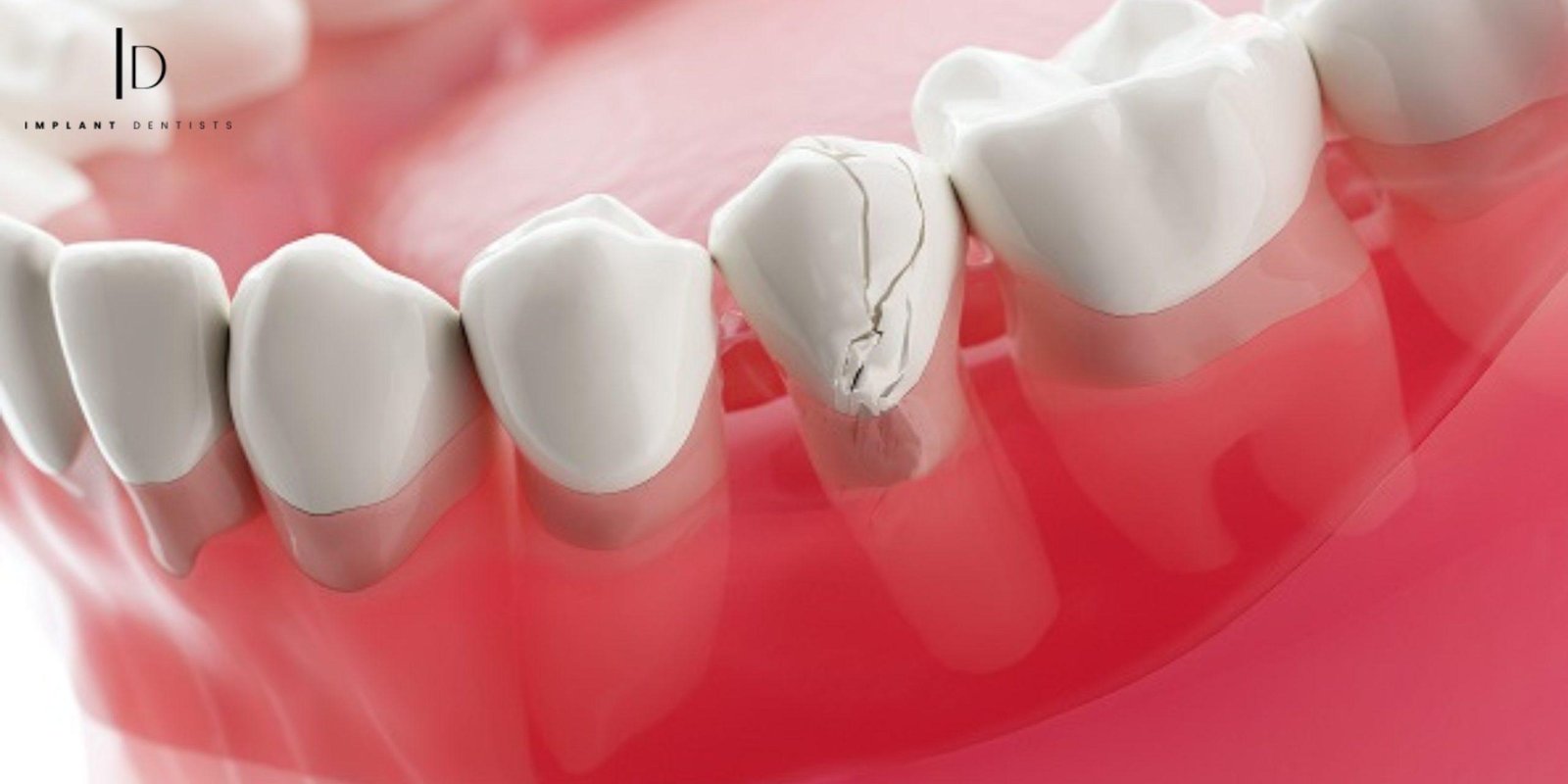
The Complete Guide to Repairing Broken Teeth| Causes, Types, and Treatment Options
February 16, 2024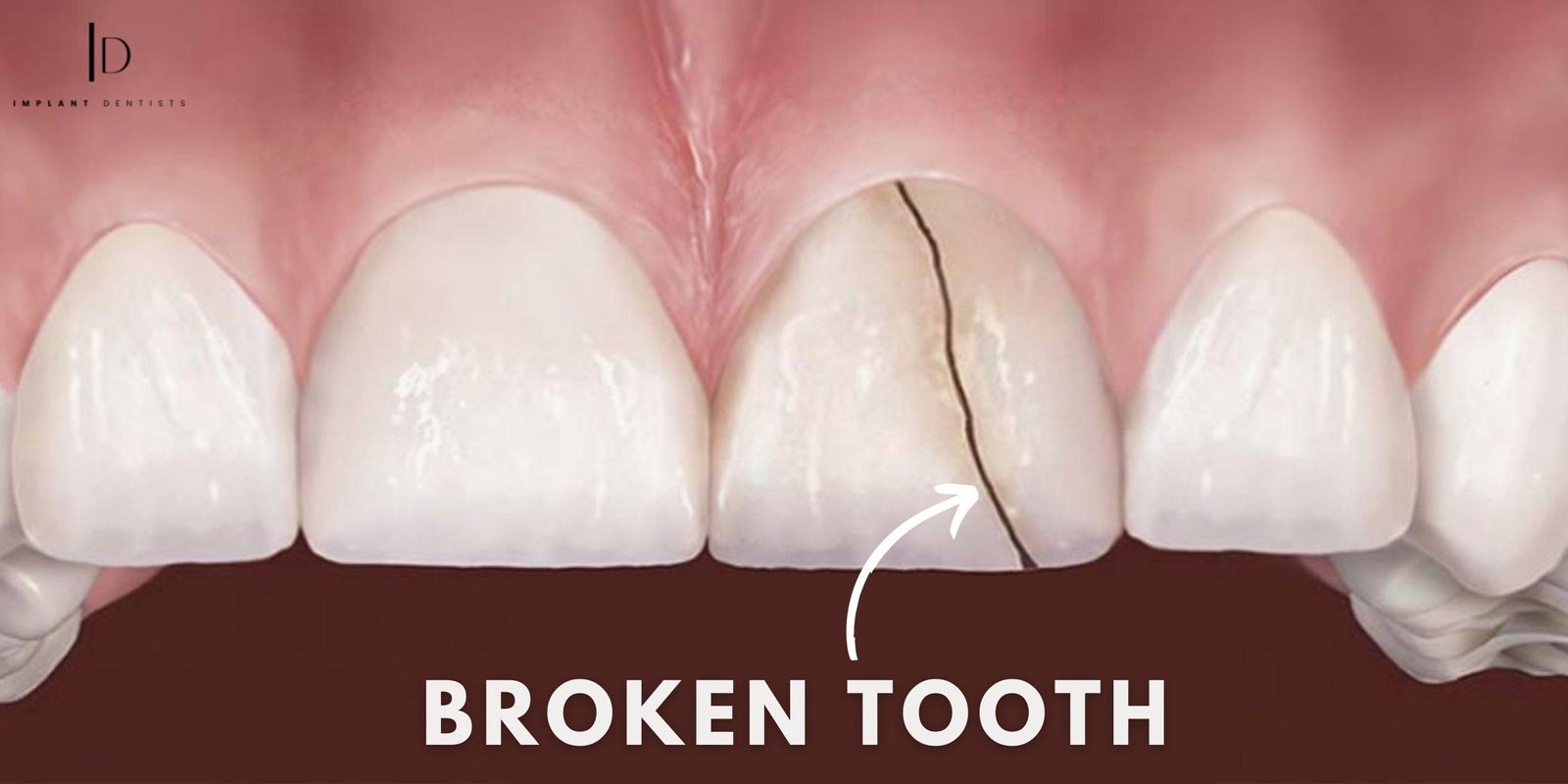
Saving Smiles| Exploring 5 Causes, Treatments & Benefits for Broken Tooth
February 5, 2024A broken tooth can be a worry and painful experience, affecting not just your oral health, but also your confidence in showcasing your smile. Fortunately, advancements in dental care have paved the way for effective broken tooth repair options. Broken tooth repair is a dental procedure designed to restore and renew a damaged or fractured tooth. It brings back functionality to the patient’s smile. Whether the result of an accident, injury, or decay, a broken tooth can cause discomfort, compromise oral health, and impact one’s confidence. Now, we’ll explore the causes of a broken tooth, available treatments, and the benefits of seeking prompt repair.
Causes of Broken Tooth
- Trauma or Injury: Accidents, falls, or sports related injuries can cause direct impact to the mouth, leading to a broken tooth. This can happen during activities like playing sports, falling, or any other situation where the mouth experiences forceful contact.
- Biting on Hard Objects: Chewing on hard substances such as ice, unpopped popcorn kernels, or non food items can lead to tooth breakage. The excessive force applied while biting down on hard objects can cause teeth to fracture or chip.
- Untreated Tooth Decay: Prolonged tooth decay weakens the structure of the tooth, making it more susceptible to breakage. When cavities are left untreated, they can progress and compromise the unity of the tooth, eventually causing it to break.
- Bruxism (Teeth Grinding): Regular teeth grinding, known as bruxism, can apply significant pressure on the teeth, leading to wear and tear. Over time, this constant grinding can weaken the coating and result in fractures or breaks in the teeth.
- Large Fillings or Weak Tooth Structure: Teeth with large fillings or those that have undergone extensive dental work may be more prone to breakage. The presence of a large filling can compromise the structural integrity of the tooth. If the filling is old or poorly done, the tooth becomes more susceptible to fractures.
Five Potential Treatments for a Broken Tooth
- Dental Bonding: Dental bonding is a common treatment for minor tooth fractures. It is often used for fractures caused by trauma or biting on hard objects. In this procedure, a tooth coloured resin is applied to the damaged tooth and then shaped and polished to restore its appearance and function.
- Fillings: If the broken tooth is a result of untreated tooth decay, a dental filling may be used to repair the damage. The decayed portion of the tooth is removed. A filling material is used to fill the cavity and restore the tooth’s structure.
- Dental Crowns: For more extensive tooth damage, such as a large fracture or a weakened tooth structure, a dental crown may be recommended. A dental crown is a custom made cap that covers the entire tooth, providing strength, protection, and restoring its appearance.
- Night Guards for Bruxism: If teeth grinding is the cause of the broken tooth, a dentist may recommend the use of a custom fitted night guard. This oral device is worn while sleeping to cushion the impact of grinding. It prevents further damage to the teeth.
- Root Canal Treatment: In cases where a broken tooth extends into the pulp, a root canal may be necessary. This involves removing the damaged pulp, cleaning and disinfecting the root canal, and then sealing it to prevent infection. After a root canal, a crown is often placed to strengthen and protect the tooth.
Benefits about Broken Tooth Treatment
- Improved Oral Health: Seeking timely broken tooth repair not only relieves pain but also contributes to overall oral health. Addressing fractures prevents the risk of infections and decay that may arise from exposed tooth pulp.
- Enhanced Aesthetics: Dental repairs, such as bonding, crowns, or veneers, go beyond functional benefits. They restore the natural appearance of the tooth. This boosts your confidence and allows you to smile freely without concerns about visible damage.
- Long-term Cost Savings: Investing in broken tooth repair can save you money in the long run. Addressing the issue promptly helps prevent further complications that may require more extensive and expensive dental procedures in the future.
- Restored Functionality: Repairing a broken tooth ensures that you can comfortably chew and eat without discomfort. This restoration of functionality is essential for proper digestion and overall well-being.
- Preservation of Natural Teeth: Certain treatments, like dental bonding and crowns, aim to preserve the natural structure of the tooth. This is advantageous compared to extraction, as it helps maintain the integrity of your natural teeth for as long as possible.
- Boosted Confidence: A healthy, well-maintained smile can significantly impact your self-esteem. By addressing a broken tooth promptly, you improve the physical aspects of your smile. You enhance your mental well-being by feeling more confident and comfortable in social situations. Address a broken tooth promptly to maintain this feeling.
- Customized Solutions: Dental professionals offer a range of repair options tailored to your specific needs. Whether it’s a minor chip or a more extensive fracture, there are personalized solutions that cater to the severity of the damage, ensuring optimal results.
Conclusion
In the journey to broken tooth repair, recognizing the causes is key. Understanding the signs and embracing the available treatment options are also important. Whether your tooth has suffered a minor chip or requires a more extensive restoration, the benefits of timely repair extend beyond pain relief. By promptly addressing a broken tooth, you not only alleviate discomfort but also prevent further damage, ensuring the longevity of your oral health. The array of treatment options, from dental bonding to implants, allows for personalized solutions tailored to your unique situation. Our dedicated dental care team is committed to delivering personalized and effective treatment for broken teeth. They help you regain confidence in your oral health with compassionate care.
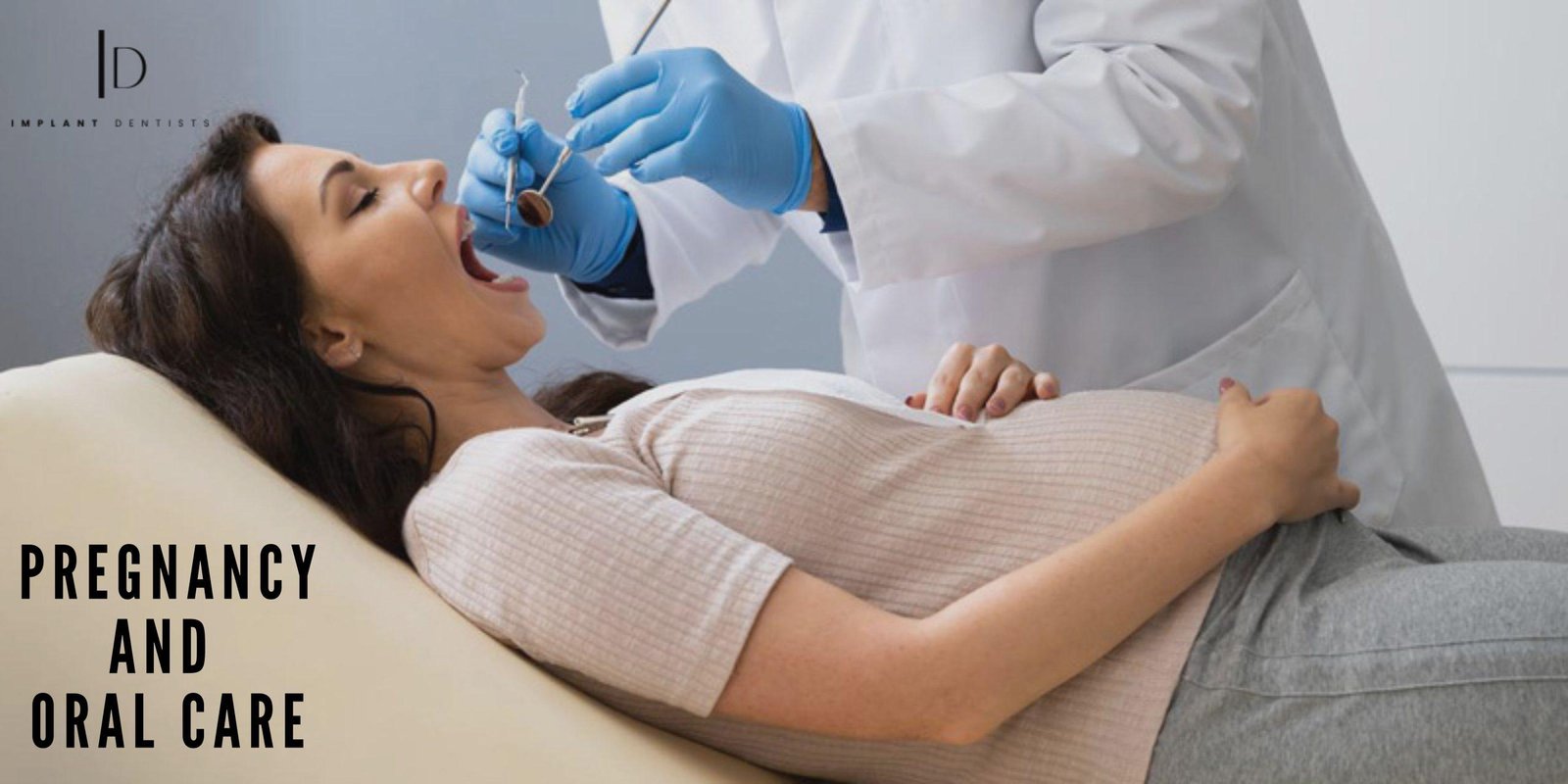
Why Prioritizing Oral Health During Pregnancy Matters?
January 30, 2024
Worried About Loose Teeth? Don’t Panic, Get Help!
January 22, 2024Why Do Teeth Loosen?
- Gum disease: This inflammatory condition, often caused by poor oral hygiene, can damage the tissues and bone that support your teeth, leading to loosening.
- Trauma: A blow to the face or injury to the mouth can damage the supporting structures of a tooth, causing it to loosen.
- Teeth grinding: Chronic teeth grinding, also known as bruxism, can wear down teeth and the surrounding bone, leading to loosening.
- Medical conditions: Certain medical conditions, such as osteoporosis or diabetes, can affect bone health and contribute to lose teeth.
Symptoms to Watch Out For:
- Significant tooth movement: If your tooth is noticeably shifting or feels very loose, it’s important to get it checked out.
- Pain or bleeding: Pain or bleeding around a loose tooth can be a sign of infection or further damage.
- Difficulty chewing or speaking: If a loose tooth is affecting your ability to eat or speak normally, it’s time to see a dentist.
Treatment Options for Loose Teeth:
- Deep cleaning and periodontal therapy: If gum disease is the culprit, deep cleaning and periodontal therapy can help reverse the damage and stabilize the tooth.
- Splinting or bonding: In some cases, a loose tooth can be splinted or bonded to neighbouring teeth for added support.
- Crown lengthening: If gum recession has exposed the root of the tooth, crown lengthening can restore the gum tissue and provide a stable base for the tooth.
- Dental implants: If a loose tooth is beyond saving, dental implants can provide a permanent and natural-looking replacement.
Prevention is Key:
- Practice good oral hygiene: Brush your teeth twice a day, floss daily, and use mouthwash to remove plaque and bacteria that can contribute to gum disease.
- Schedule regular dental checkups and cleanings: Your dentist can identify and address any early signs of gum disease or other problems that could lead to lose of teeth.
- Wear a mouth guard during contact sports: This can help protect your teeth from injury.
- Manage stress: Stress can contribute to teeth grinding, so finding healthy ways to manage stress can be beneficial for your oral health.
Don’t Let Loose Teeth Steal Your Smile:
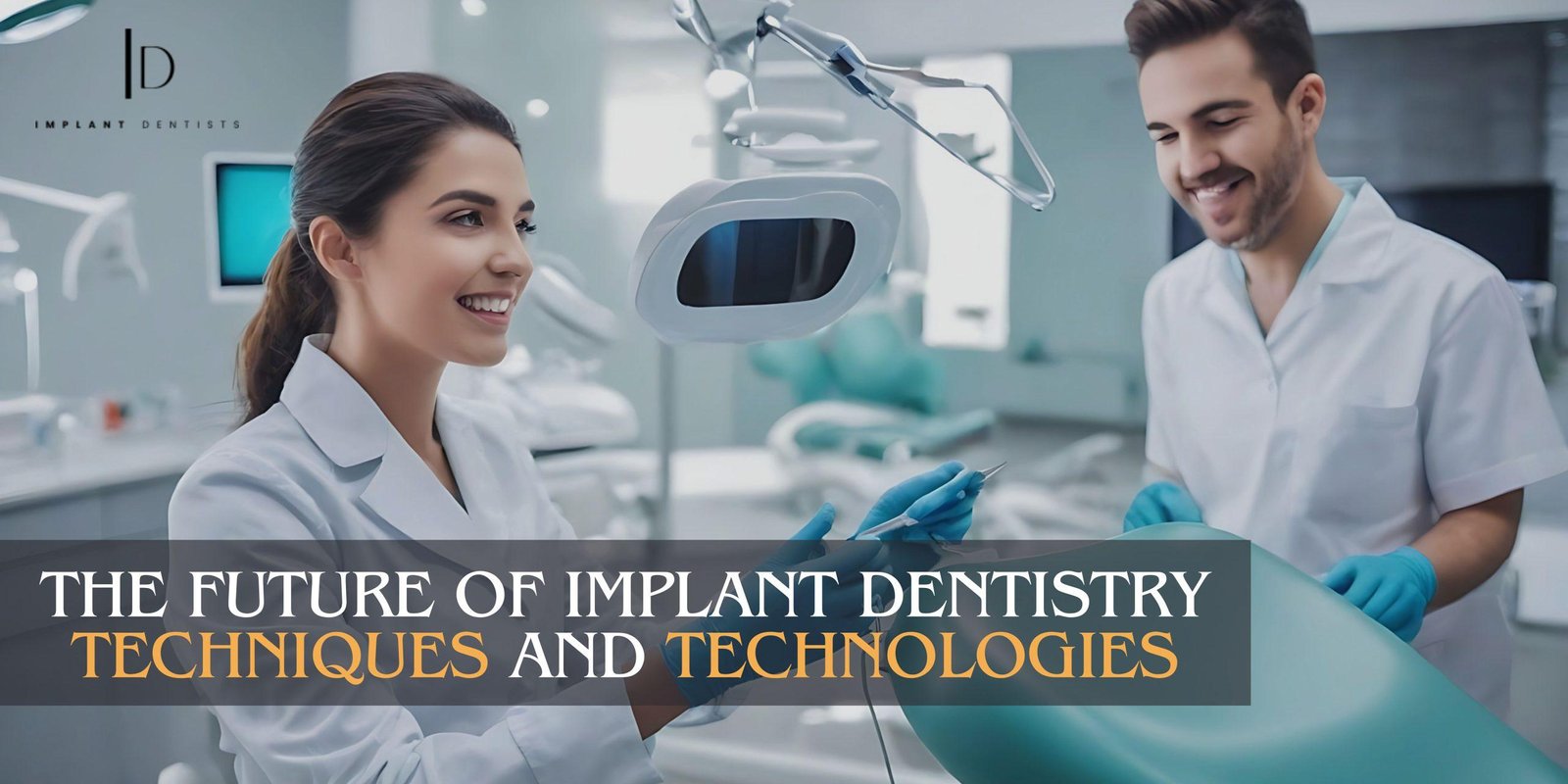
The Future of Implant Dentistry | Emerging Techniques and Technologies
January 18, 2024In recent years, implant dentistry has witnessed significant advancements, ushering in a new era of possibilities for patients seeking durable and aesthetically pleasing tooth replacement options. This blog explores the latest techniques and technologies that are shaping the future of implant dentistry, and the numerous benefits they offer to both patients and dental practitioners.
3D Printing in Implant Manufacturing
In the rapidly evolving landscape of healthcare, 3D printing has emerged as a groundbreaking technology, ushering in a new time of precision and customization in implant manufacturing. This innovative approach to crafting implants has revolutionized the traditional methods, offering unparalleled advantages in terms of design flexibility, patient-specific customization, and accelerated production processes.
- Revolutionizing Precision: Traditionally, implant components were mass-produced, leading to certain limitations in customization. The advent of 3D printing has revolutionized the manufacturing process, allowing for highly personalized implants tailored to each patient’s unique dental anatomy. This not only improves the fit and function of implants but also enhances the overall aesthetic outcome.
- Accelerating Treatment Timelines: With 3D printing, dental laboratories can produce implants faster than ever before. This technology has significantly reduced the time patients spend waiting for their customized implants, enabling quicker treatment timelines and improved patient satisfaction.
Digital Impressions and Virtual Planning
Embark on a transformative journey into the empire of innovation with our cutting-edge service: Digital Impressions and Virtual Planning. In a world driven by technology, we redefine the way you envision and strategize, seamlessly blending the physical and digital landscapes.
- Enhanced Accuracy: Gone are the days of messy and uncomfortable traditional impressions. Digital impressions provide a more comfortable experience for patients, while also delivering highly accurate data for treatment planning. Virtual planning tools allow dentists to meticulously plan implant placement, minimizing the risk of complications and ensuring optimal outcomes.
- Predictable Results: Digital impressions and virtual planning contribute to more predictable results in implant dentistry. Implant Dentists can visualize the entire treatment process before it even begins, leading to increased precision during surgery and a higher likelihood of successful implant integration.
Osseointegration Enhancements
Osseointegration Enhancements refers to cutting-edge advancements in the field of medical and dental science. The aimed at improving the integration of prosthetic devices with the natural bone structure of the human body. It is a crucial process that ensures the stability and functionality of prosthetic implants. Such as dental implants and limb prostheses.
- Smart Implants: Recent advancements in implant materials have led to the development of “smart implants” equipped with sensors. These sensors monitor factors like pressure, temperature, and pH levels in the surrounding tissues. This real-time data helps dentists track the progress of osseointegration and identify any issues early on, leading to improved postoperative care.
Benefits of Adopting Emerging Techniques and Technologies
- Improved Patient Outcomes: The integration of advanced technologies ensures that patients experience enhanced precision, reduced discomfort, and quicker recovery times. This leads to overall improved outcomes and greater patient satisfaction.
- Efficiency for Practitioners: Dental practitioners benefit from the efficiency of modern techniques and technologies, allowing for streamlined workflows, better treatment planning, and more accurate surgical procedures. This not only saves time but also enhances the overall quality of care provided.
- Customization and Aesthetics: The ability to create highly customized implants using 3D printing, along with precise digital planning, allows for superior aesthetic results. Patients can enjoy natural-looking and seamlessly integrated dental implants that match their individual features.
- Enhanced Monitoring and Aftercare: Smart implants and bioactive coatings contribute to improved monitoring of the healing process, enabling early detection of potential issues. This results in better aftercare and long-term success rates for dental implant treatments.
Read about Dental Problems, issues and Effective Treatments!
Conclusion
The future of implant dentistry is undeniably exciting, with emerging techniques and technologies transforming the landscape. As these innovations continue to evolve, patients can expect more personalized, efficient, and aesthetically pleasing solutions. While dental practitioners benefit from enhanced precision and streamlined workflows. Embracing these advancements ensures a brighter future for the field of implant dentistry.
Ignite Your Confidence with a Dazzling Smile – Because Your Smile Deserves to Shine Bright!
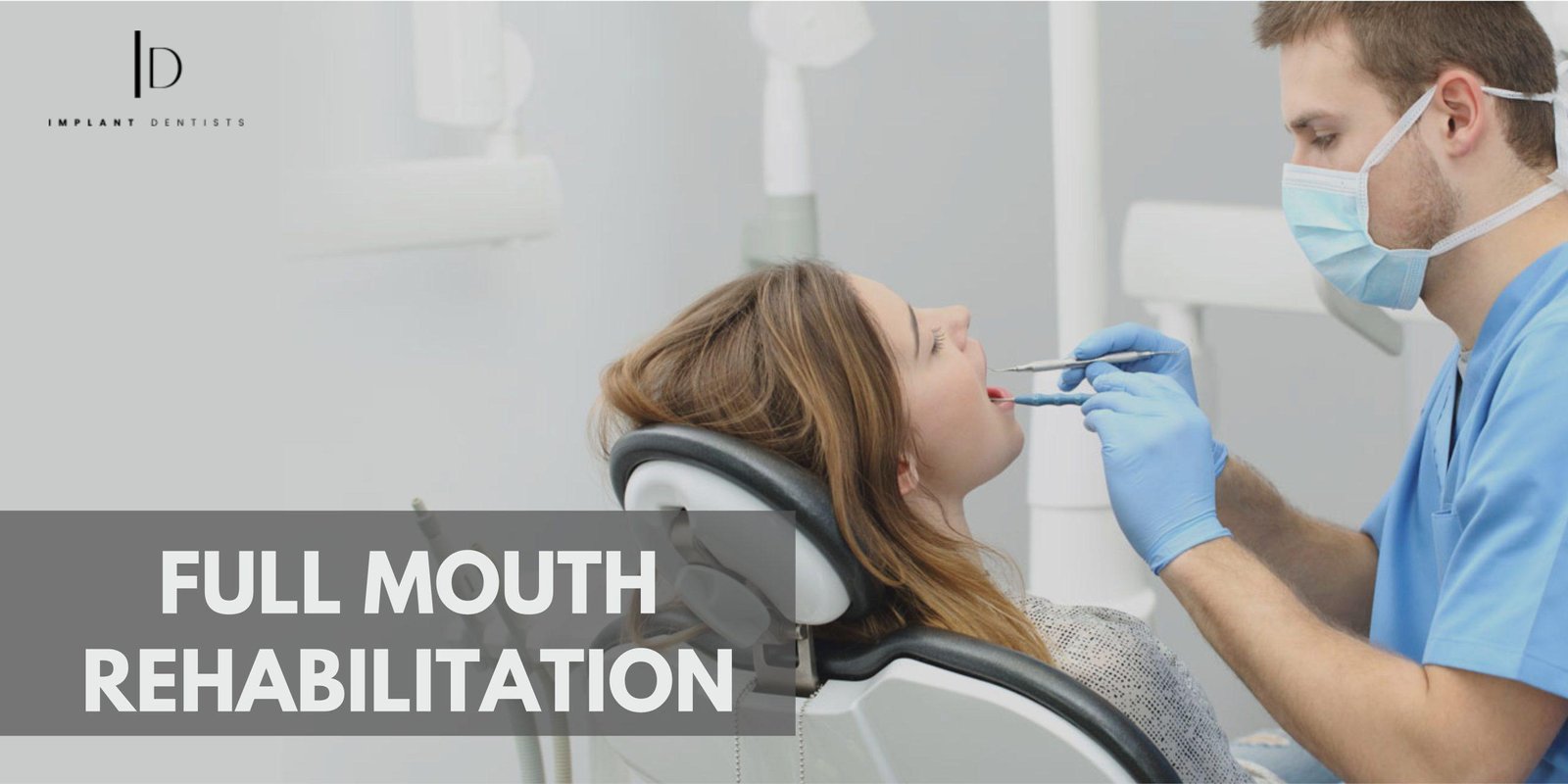
Implant Solutions for a Radiant Smile| Full Mouth Rehabilitation in Crewe, United Kingdom
January 16, 2024Full mouth rehabilitation is a comprehensive dental treatment that aims to restore oral health and functionality. In recent years, dental implants have played a pivotal role in revolutionizing full mouth rehabilitation procedures, offering patients in Crewe, United Kingdom. A lasting solution to various dental issues. Now, we explore the significance of implants in full mouth rehabilitation. The benefits they bring to individuals seeking a complete dental transformation.
Understanding Full Mouth Rehabilitation
Full Mouth Rehabilitation, also known as full mouth restoration, is a comprehensive and personalized dental procedure designed to address multiple dental issues. It restores optimal oral health, function, and aesthetics. This advanced and transformative treatment involves a meticulous combination of various dental procedures. This tailored to the unique needs of each individual.
Patients seeking Full Mouth Rehabilitation often present with a range of dental concerns, such as missing teeth, extensive tooth decay. Worn-down enamel, gum disease, bite problems, or a combination of these issues. The primary goal of Full Mouth Rehabilitation is to provide a holistic and integrated approach to address these concerns. This is ultimately enhancing both the functionality and appearance of the entire mouth.
Explore Dental Implants
Dental implants are artificial tooth roots that are surgically placed into the jawbone to support replacement teeth or bridges. There are several types of dental implants, classified based on various factors such as implant design, materials used, and the surgical procedure.
Here are some common types of dental implants:
- Single Tooth Implants: Used when a single tooth is missing, a single implant is placed into the jawbone, and a crown is attached to it.
- Multiple Tooth Implants: Used when several adjacent teeth are missing, implant-supported bridges are anchored to implants rather than natural teeth.
- Full Arch Implants: These are used when an entire arch of teeth (upper or lower) needs to be replaced. All-on-4 refer to the number of implants used to support a full arch of teeth.
- Zygomatic Implants: These implants are longer and are anchored into the cheekbone (zygoma) instead of the jawbone. They are used when there is insufficient bone in the upper jaw.
- Mini Implants: Smaller in diameter than traditional implants, mini implants are often used in situations where there is limited space or bone.
The Role of Implants in Replacing Missing Teeth
Dental implants play a crucial role in replacing missing teeth. This providing a durable and natural-looking solution for individuals with one or more missing teeth. The process involves surgically placing a metal post into the jawbone. It serves as a stable anchor for a replacement tooth or a bridge.
Here are key aspects of the role of implants in replacing missing teeth:
- Stability and Support: Dental implants offer stability and support comparable to natural teeth. The implant fuses with the jawbone through a process called osseointegration, creating a strong foundation for the replacement tooth.
- Improved Functionality: Unlike removable dentures, dental implants function like natural teeth. They allow for normal biting, chewing, and speaking, providing a higher level of comfort and functionality.
- Preservation of Jawbone: When a tooth is lost, the jawbone in that area can start to deteriorate over time due to lack of stimulation from chewing. Dental implants help preserve the jawbone by acting as artificial tooth roots and preventing bone loss.
- Natural Appearance: Implants are designed to look and feel like natural teeth. The replacement tooth, also known as a crown, is custom-made to match the colour, shape, and size of the surrounding natural teeth, ensuring a seamless and natural appearance.
- Longevity: With proper care and maintenance, dental implants have a high success rate and can last for many years, even a lifetime. This makes them a durable and long-term solution for replacing missing teeth.
Benefits of Implants in Full Mouth Rehabilitation
- Enhanced Aesthetics and Confidence: Implants provide a natural-looking appearance, restoring not only the functionality of the teeth but also the aesthetics. This, in turn, boosts confidence and self-esteem for individuals undergoing full mouth rehabilitation.
- Improved Oral Functionality: Dental implants allow for improved chewing and speaking abilities, providing patients with a level of comfort and functionality comparable to natural teeth.
- Long-Term Durability: One of the significant advantages of dental implants is their long-term durability. With proper care, implants can last a lifetime, making them a cost-effective and sustainable choice for full mouth rehabilitation.
- Stability and Strength: Dental implants provide a stable and strong foundation for the replacement of multiple teeth. This stability is crucial in full mouth rehabilitation, where the goal is to restore the entire dentition.
- Natural Feel and Functionality: Implants mimic the natural function and feel of teeth. This is particularly important in full mouth rehabilitation, as patients aim to regain the ability to bite, chew, and speak comfortably. Just like they would with natural teeth.
Conclusion:
In Crewe, United Kingdom, dental implants have become an integral part of full mouth rehabilitation, offering patients a transformative solution to various dental challenges. The combination of advanced technology and skilled dental professionals ensures that individuals seeking full mouth rehabilitation in Crewe can enjoy the benefits of a restored smile. This improved oral health, and enhanced overall well-being.
